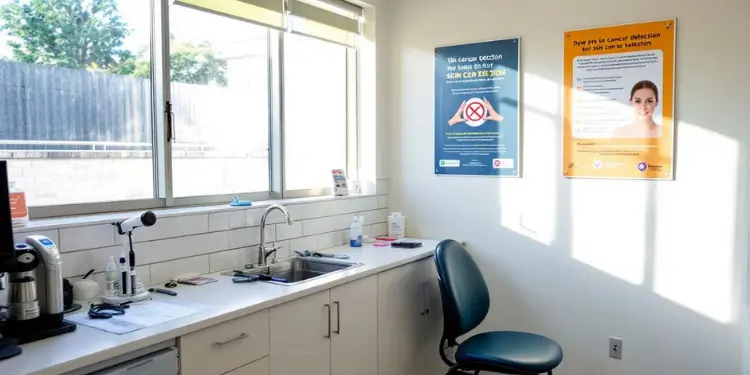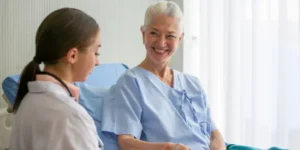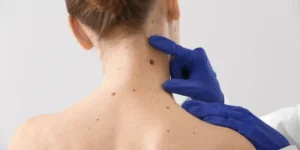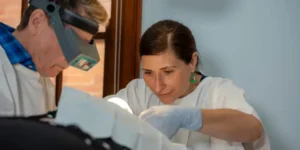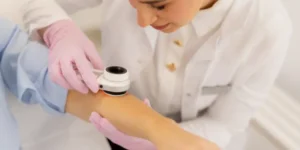Skin spots that change shape or size can be concerning. In Brisbane, skin cancer rates are among the highest in the world due to our sunny climate. Skin Cancer Removal Brisbane services are essential for early detection and treatment.
Skin Cancer Hub in Woolloongabba provides expert Skin Cancer Removal Brisbane services with highly trained doctors specializing in skin cancer care.
Situated at 61 Ipswich Rd, Woolloongabba, Brisbane, Queensland, our new purpose-built clinic is dedicated to the detection, diagnosis, and treatment of skin cancer and melanomas.
Our experienced doctors, with additional training, offer comprehensive care in prevention, diagnosis, treatment, and management.
Prompt treatment is available.
Common Types of Skin Cancer

Australia has the highest skin cancer rates in the world. The harsh sun makes our skin very prone to damage. Most skin cancers start in the top layer of skin where the sun hits most.
Basal cell carcinoma (BCC) tops the list as the most common type. It looks like a shiny bump or a pink growth that may bleed easily. BCCs grow slowly and rarely spread to other parts of the body.
Next is squamous cell carcinoma (SCC), which often shows up as a rough, scaly patch that can turn into an open sore. SCCs can grow deep and may spread if not treated early.
Melanoma is less common but more deadly. It often starts in moles that change shape, size, or color. Early signs include dark spots with odd edges or many colors. Merkel cell carcinoma is rare but grows fast.
It looks like a flesh-colored bump that grows quickly. All these skin cancers need quick action. If you spot any odd skin changes, see a doctor right away. At Skin Cancer Hub, doctors check all types of skin spots to keep patients safe.
Early detection saves lives and makes treatment much easier. Have you noticed any unusual changes in your skin?
Watch this video for further information about skin cancer diagnosis and treatment:
Surgical Treatments for Skin Cancer in Brisbane
Skin cancer needs quick action to stop it from spreading. The Skin Cancer Hub at 61 Ipswich Rd, Woolloongabba offers excellent surgical care for all types of skin cancer.
- Surgical excision is the most common way to remove skin cancer. Doctors cut out the cancer and some healthy skin around it to make sure they get all the bad cells.
- Mohs surgery is effective for face cancers. The doctor takes out thin layers of skin one at a time and checks each under a microscope until no cancer cells remain.
- Curettage and electrodesiccation helps with small basal cell carcinomas. The doctor scrapes off the cancer with a tool called a curette and then burns the area to kill any leftover cancer cells.
- Cryosurgery freezes the cancer cells with liquid nitrogen. This works best for small, early-stage skin cancers on the body’s surface.
- Skin grafts fix larger wounds after cancer removal. The surgeon takes skin from another part of your body to cover the spot where the cancer was cut out.
- Skin flaps use nearby skin to patch up surgery spots. This helps areas heal better and look more normal after cancer removal.
- Plastic surgery might be needed for cancers in difficult spots like the nose or ears. The plastic surgeon helps make the area look as normal as possible after the cancer is gone.
- The Skin Cancer Hub has doctors with specialized training in skin cancer care. They use advanced tools to find and cut out skin cancer safely.
- No referral is needed to see a skin cancer doctor at the Skin Cancer Hub. Appointments can be arranged promptly for any suspicious skin lesion.
- Medicare covers some of the cost for most skin cancer surgeries. The staff can explain what expenses to expect before any work is done.
Watch this video for more details about surgical treatment methods:
Non-Surgical Options for Skin Cancer Removal
Not all skin cancers need surgery. Many patients can get great results from treatments that don’t require cuts or stitches.
- Cryotherapy uses freezing to kill cancer cells. This works well for small basal cell carcinomas and some squamous cell carcinomas. The doctor applies liquid nitrogen to freeze the spot. A blister forms, then heals in about 2-3 weeks.
- Topical creams like imiquimod help the body fight cancer cells. These creams are applied at home for several weeks. They work best for thin basal cell carcinomas or early skin cancers.
- Photodynamic therapy combines special drugs and light. First, a cream makes cancer cells more light sensitive. Then blue light shines on the area to kill those cells. This option leaves minimal scarring.
- Radiation therapy targets cancer cells with high-energy rays. This option helps older or frail patients who cannot have surgery. It also works for hard-to-reach spots like eyelids or nose tips.
- Curettage and electrodesiccation scrapes away cancer with a special tool. The doctor then burns the base with an electric needle. This method suits small, shallow skin cancers.
- Mohs micrographic surgery removes cancer layer by layer. The doctor checks each layer under a microscope until no cancer cells remain. This saves healthy skin and increases cure rates.
- Laser therapy uses focused light beams to remove cancer cells. This method causes less bleeding and swelling than other options. It works best for very shallow skin cancers.
- Chemotherapy creams like 5-fluorouracil kill fast-growing cells. These creams are applied at home for several weeks. They treat multiple spots at once but may cause temporary redness and irritation.
- Immunotherapy helps the body’s defenses attack cancer cells. New drugs boost the immune response to fight skin malignancies. This helps when cancer has spread beyond one spot.
- The NHS offers rebates for many non-surgical treatments. Patients should ask about what costs may be covered by the public health system for their case.
Watch this video for further explanation of non-surgical procedures:
Expert Surgeons and Clinics in Brisbane
Finding the right skin cancer specialists can feel overwhelming. Many Brisbane residents put off essential skin checks due to confusion about where to go. This delay can lead to more complex treatments later.
| Clinic Name | Location | Special Features |
|---|---|---|
| The Skin Cancer Hub | 61 Ipswich Rd, Woolloongabba | Purpose-built facility with dedicated operating theatres; No referral needed |
| Royal Brisbane Hospital | Herston | Public hospital with multidisciplinary team approach |
| Princess Alexandra Hospital | Woolloongabba | Teaching hospital with advanced treatment options |
| Mater Hospital | South Brisbane | Comprehensive cancer care services |
| Wesley Hospital | Auchenflower | Private hospital with specialist skin cancer surgeons |
The Skin Cancer Hub stands out among these options. This Woolloongabba clinic provides complete care from detection through treatment. Their doctors have extra training in skin cancer management. Patients appreciate getting all services in one spot.
Modern equipment makes a big difference in treatment outcomes. The Skin Cancer Hub features top-grade surgical tools and diagnostic technology. These resources allow doctors to spot and remove skin cancers with greater accuracy.
Brisbane’s subtropical climate creates higher skin cancer risks. Local specialists understand these specific challenges. They can offer advice suited to Queensland conditions and lifestyle factors.
Most skin cancer procedures happen as day surgeries. Patients go home the same day after treatment. This approach reduces stress and speeds recovery time.
Early detection dramatically improves treatment success rates. Brisbane’s expert clinics emphasize regular screenings as the first defense against serious skin cancer. Many offer full-body examinations with digital imaging.
Wait times vary between facilities. Private clinics often provide faster appointments than public hospitals. The Skin Cancer Hub aims to minimize waiting periods for worried patients.
Costs differ between public and private options. Medicare covers some expenses at public hospitals. Private clinics may charge gap fees but offer quicker access to specialists.
Follow-up care forms a critical part of skin cancer treatment. Brisbane’s top clinics maintain close contact with patients after procedures. They schedule regular check-ups to monitor healing and watch for new concerns.
Training and credentials matter when choosing a skin specialist. Look for doctors with specific qualifications in dermatology or skin cancer medicine. Fellowship status with professional medical colleges indicates advanced expertise.
Patients are advised to follow detailed post-treatment care protocols. Protective measures against excessive sun exposure and guidance on lifestyle adjustments help maintain skin health.
Conclusion
Taking care of your skin is a must in sunny Brisbane. The Skin Cancer Hub offers excellent care for all skin cancer needs in one spot. Early checks save lives, so don’t wait for signs to show up.
Your health matters, and the right team makes all the difference in skin cancer care.
Patients benefit from comprehensive follow-up plans that include recovery advice, sun safety recommendations, and lifestyle adjustments to minimize the risk of recurrence.
Disclaimer: This content is for informational purposes only and is not a substitute for professional medical advice. Please consult a qualified skin cancer specialist for a proper skin cancer diagnosis and treatment.
Our team comprises experienced doctors with special qualifications in dermatology and skin cancer care.
Author Credentials: Content is produced by the Skin Cancer Hub team. The team includes specialists with expertise in skin cancer surgery, plastic and reconstructive surgery, and general surgery. Each doctor has advanced training and holds qualifications in dermatology.
They have extensive experience treating basal cell carcinomas (bcc) and squamous cell carcinomas.
Data and Research Disclosure: Data was gathered from Australian government health statistics and clinic records. The clinic uses detailed diagnostic methods and digital imaging. All information is updated with current medical practices.
Local Insight: Brisbane’s hot climate increases the need for regular skin checks. The Skin Cancer Hub addresses the unique needs of Queensland residents. This focus improves patient outcomes and supports ongoing care.

